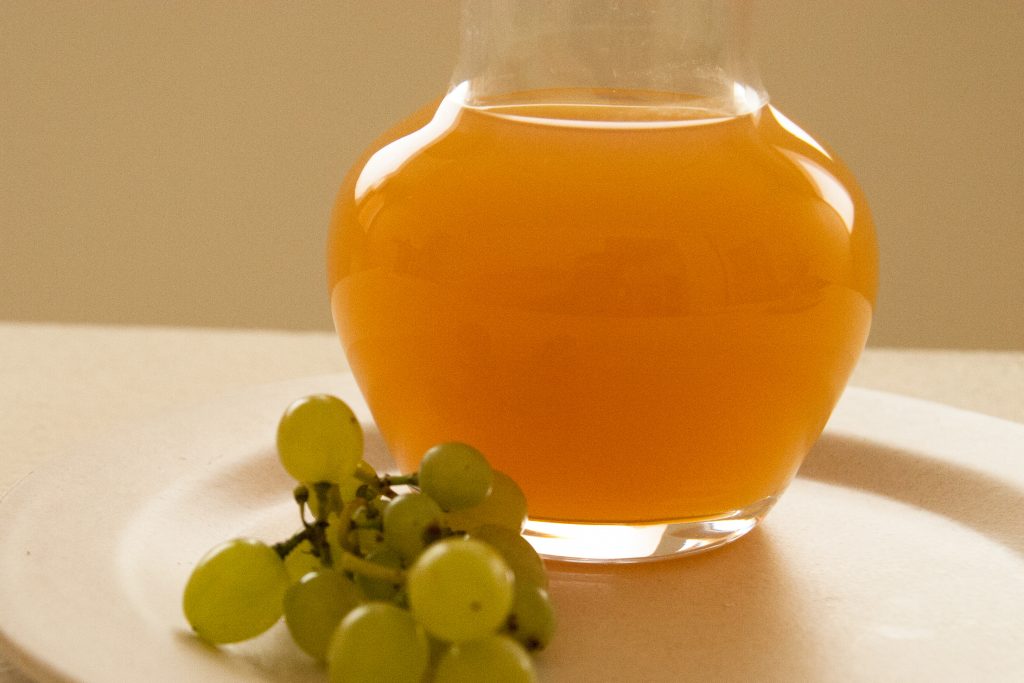
What would we do without lemon juice? It’s an essential ingredient in both cooking and mixology, two of my favorite activities. Unfortunately, many of us can’t forage for lemons. Fortunately, those of us who don’t live in citrus-friendly climates, can probably forage for wild grapes, and the juice of unripe grapes makes an excellent lemon juice substitute called verjuice.
Verjuice (also spelled verjus) is derived from the French for green juice (jus vert). Not green in color, but green as in underripe. Traditionally, it’s made from immature grapes, currants, or crab apples, all of which are intensely sour. If you’re using grapes, harvest them just before they start to turn color. This is harder to determine if you’re harvesting immature green grapes, but tasting a few should tell you what you need to know. The fruit must be immature enough to be super sour, but not so immature that it contains no juice.
What You’ll Need to Make Verjuice:
Unripe grapes are less juicy and smaller than mature grapes, so it takes a lot of fruit to make verjuice. Five pounds of grapes will give you about a quart of verjuice. You’ll also need latex gloves, a food mill, a sieve, and coffee filters. Citric acid is optional.
What You’ll Do to Make Verjuice:
Start by washing your fruit and removing the grapes from their stems. Once you break open the fruit, work quickly to minimize oxidation. Exposure to the air gives the grape juice a brownish color. It still tastes fine, but it isn’t as pretty as the unoxidized, golden color.
Using the coarsest plate of your food mill, grind the fruit. You’ll need a little hand strength here, because underripe grapes are hard and offer some resistance. You’re just breaking up the fruit, so don’t worry if a few seeds sneak through the holes in the food mill. You should end up with a rough mix of juice and pulp.
Unripe grapes are highly acidic, which is what makes them so wonderfully sour. But prolonged contact with this acidic fruit can sting your hands, so now’s the time to put on those latex gloves. Squeeze handfuls of grape pulp over the sieve (into a bowl) to collect maximum juice. Then, pour that juice through a moistened coffee filter. When enough sediment builds up in the coffee filter to slow your filtration speed, use a new filter. Moisten each coffee filter before using, so it absorbs as little juice as possible.
Transfer the filtered juice into a mason jar, add 1/2 teaspoon of citric acid, and shake vigorously to combine. Citric acid is a preservative that will let you keep refrigerated verjuice for up to six months. If you expect to use your verjuice quickly, you can skip this ingredient.
Refrigerate your verjuice for 24 – 48 hours, then check the jar; there should be a layer of sediment at the bottom. This doesn’t harm the verjuice or make it less delicious, but it will gradually turn the liquid brown, so why not get rid of it? Gently pour the liquid off the sediment into a clean jar and you’re done.
Verjuice is a versatile substitute for vinegar or lemon juice in salad dressings, sauces, or marinades. The flavor is tart and not discernibly grapey. In fact, I’ve done blind taste tests on several unsuspecting dinner guests who were sure it was lemon juice. For foragers outside citrus territory, it’s practically a miracle.
How would you make this with unripe crab apples?
It depends on what you have for equipment. Crabapples would be harder (but not impossible) to grind through a food mill than grapes. If you have a steam juicer or cider press, you could try that. If not, you might also try juicing them the way you would juice any fruit for making jelly, i.e. barely cover a shallow layer of fruit with water in a sauté pan and simmer until the fruit is soft enough to mash. Then mash and strain through cheesecloth or a jelly bag.